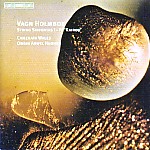In the late 1950s and early ’60s, Vagn Holmboe wrote four sinfonias for strings, the first three having a single movement in several contrasting tempos, and the last consisting of a prelude, two interludes, and a postlude. With its brief individual movements spread among the previous three works, you get Kairos, a single piece playing for about an hour. Much of the writing is quite beautiful, but an hour of string orchestra is a tall order for most listeners, even if the writing were less spare than is Holmboe’s norm. In short, this is a piece for the composer’s fans rather than one by which to make his acquaintance for the first time.
Kairos has been recorded previously, and quite well, by Dacapo, but this one is just as good, and it’s quite intelligently put together in that Sinfonia IV is presented twice, as part of the larger whole and separately (since you can play the other three, single-movement pieces individually at your convenience). Owain Arwel Hughes already has proven his credentials as a Holmboe interpreter in his excellent complete symphony cycle for BIS, so if you were collecting those pieces then this release may well represent your next logical acquisition. But do give it time, and don’t feel any obligation to take it all in at a sitting. [4/7/2010]
































